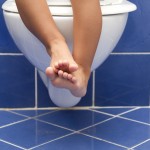Child constipation, characterized by stools that are hard, painful, and difficult to pass, is a very common and trying problem in children. The frequency of stooling varies from infant to infant and child to child, and is not as important as how easily stools pass. Diet, hydration, behavior, and environment are all issues that influence stooling and can lead to constipation.
Changing from breast milk to formula, too much cow’s milk, not enough water, or the typical high-carb toddler diet can all lead to harder stools.
Another big culprit is stool holding. Brought on by fear, stool holding can occur after passing large, hard painful stools, or being uncomfortable using a toilet away from home. Unfortunately, both situations create a vicious cycle; fear causes holding and the eventual passage causes pain, producing more holding.
Here’s how I recommend you treat constipation:
In infants, give 2-4 oz. of diluted prune or pear juice.
In older infants, incorporate higher fiber foods like apricots, plums, and prunes.
In toddlers and children, increase fluid intake, make sure they’re eating high-fiber foods, like raw vegetables, fruits, and whole grains, and, finally, cut back on the high-dairy, high-carb diet.
For stool holders, you will most likely need a stool softener (you can discuss this with your pediatrician) and some retraining. Have your child sit on the toilet 10-15 minutes after each meal for at least 10 minutes and use a reward system when they are successful.
You should see your pediatrician if your child has been experiencing constipation for a long time, pain or blood with bowel movements, or generalized abdominal pain.
I know it’s tough mom, but be patient. Constipation is a chronic problem that will take some time to work its way out!



